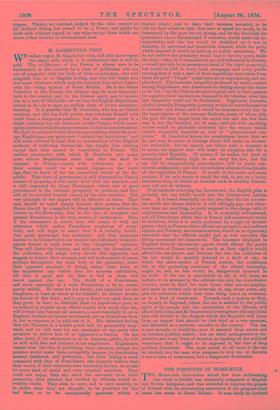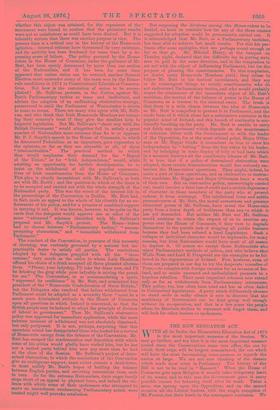THE FORTUNES OF HOME-RULE.
filHE Home-rule Convention which has been deliberating JL this week in Dublin was nominally composed of English and Scotch delegates, and was intended to impress the people of Ireland with an encouraging conviction of the progress their cause has made in Great Britain, It may fairly be doubted whether this object was attained, for the organisers of the movement were forced to confess that the pecuniary results were not so satisfactory as could have been desired. But it is tolerably certain that there was another purpose in view. The present time is a critical one in the history of the Home-rule agitation ; internal schisms have threatened its very existence, and its activity has been deadened for some time by a de- pressing sense of failure. The- policy pursued by the Home- rulers in the House of Commons, under the guidance of Mr. Butt, has been openly denounced by more than one section of the Nationalists, and it has been for some time apparent that unless union can be restored, another General Election must surrender many of the seats won by the Home- rule candidates in 1874 to Constitutional Liberals or Conserva- tives. But how is the restoration of union to be accom- plished? Mr. Sullivan protests, in the Nation against Mr. Butt's Parliamentary tactics as tame and ineffectual, and advises the adoption of an unflinching obstructive strategy, perservered in until the Parliament at Westminster is driven to come to terms. There are many who agree with Mr. Sulli- van, and who think that Irish Home-rule Members are betray- ing their country's trust if they give the smallest help to Imperial legislation. But Mr. Sullivan's "short way with the British Government" would altogether fail to satisfy a great number of Nationalists more extreme than he is or appears. Mr. P. J. Smyth's speech in the House of Commons, in which he denounced Federalism as an imposture, gave expression to the opinions, so far as they are utterable at all, of these irreconcileables." The practical method in which they would emphasise their demand for the "Repeal of the Union," or for "Irish independence," would, while awaiting an opportunity for further developments, be to insist on the withdrawal of all the popular representa- tives of Irish constituencies from the House of Commons. This plan is clearly inconsistent with Mr. Sullivan's, as both are with Mr. Butt's ; and the question is, which of the three is to be accepted and carried out with the whole strength of the Nationalist party. This was the secret of the interest felt in the proceedings of the Convention in Dublin. Mr. Butt had, in fact, made an appeal to the whole of his olienale for an en- dorsement of his policy, and for a promise of combined support in carrying it out. It was known, however, to be quite on the cards that the delegates would approve one or other of the more "advanced" schemes identified with Mr. Sullivan's
proposal and Mr. Smyth's protest. The Home - rulers had to choose between "Parliamentary tactics," "uncom- promising obstruction," and "immediate withdrawal from Parliament."
The conduct of the Convention, in presence of this necessity of choosing, was curiously governed by a natural but im- practicable desire to satisfy all parties. The resolutions adopted by the delegates grappled with all the "three courses," very much as the sailor to whom Lady Hamilton offered his choice of a drink accepted all three pleasant alterna- tives. "Please, your ladyship, I'll take the dram now, and I'll be drinking the grog while your ladyship is mixing the punch for me." The Convention, in as accommodating a spirit, " expressed its confidence" in Mr. Butt, and nominated him president of the "Home-rule Confederation of Great Britain," but the Delegates also resolved that before withdrawal from Parliament could be adopted as a necessity there "must be a much more determined attitude in the House of Commons upon all questions in which Ireland is concerned, so that the 'British people may beinduced to adopt the principle of division of labour in government." Thus Mr. Sullivan's obstructive policy was approved for immediate application, while the more extreme measure of withdrawal was not absolutely dismissed, but only postponed. It is not, perhaps, surprising that this uncertain sound has disappointed those who looked for a revival of Home-rule energy from the debates of the Convention. Mr. Butt has escaped the condemnation and deposition with which some of his critics would gladly have visited him, but he has not a united party behind him now any more than he had at the close of the Session. Mr. Sullivan's project of deter- mined obstruction, to which the resolutions of the Convention give an ambiguous support, must either remain a dead-letter, or most nullify Mr. Butt's hopes of holding the balance between English parties, and extorting concessions from each in turn. As for the extreme Nationalists, their anger barely stops short of an appeal to physical force, and indeed the vio- lence with which some of their spokesmen who attempted to move an amendment condemning Parliamentary action were treated might well provoke retaliation.
But supposing the divisions among the Home-rulers to be healed, we have to consider how far any of the three courses suggested for adoption could be .permanently carried out. It is acknowledged that Mr. Butt, as a Parliamentary tactician, has been able to achieve but small results. For this his par- tisans offer some apologies, that are perhaps sound enough as far as they go. Mr. Mitchel Henry, at the banquet on Tuesday night, declared that the difficulty lay in getting sixty men to pull in the same direction, and in the temptation to act not with the object of influencing Parliament, but for the purpose of pleasing the constituencies. To this temptation, no doubt, many Home-rule Members yield ; they refuse to follow Mr. Butt in his tactical movements, and they say or do extravagant things to satisfy constituencies who do not understand Parliamentary tactics, and who would probably resent the attainment of the immediate object of Mr. Butt's ambition, the control of the balance of power in the House of Commons, as a treason to the national cause. The truth is that there is a wide chasm between the idea of Home-rule as Mr. Butt is compelled to present it to Parliament, and the crude form of it which alone has a substantive existence in the popular mind of Ireland, and this breach of continuity is con- tinually breaking up the party. Mr. Butt is unable to carry out fairly any movement which depends on the maintenance of relations either with the Government or with the leader of the Opposition, for at the most critical point, Major O'Gor- man or Mr. Biggar thinks it incumbent on him to show his independence by " bolting " from the line taken by his leader, and by indulging in some display of folly or bad taste which in a moment destroys all the conciliatory labours of Mr. Butt. It is true that if a policy of determined obstruction were adopted, these erratic demonstrations would less seriously em- barrass the Home-rulers' operations. They might, indeed, be made a part of those operations, and as obstructive or destruc- tive machines Mr. Biggar and Major O'Gorman have a worth of their own. But an obstructive policy, unswervingly carried out, would involve a fatal loss of credit and a certain degeneracy of character in those members of the party who at present redeem it from contempt. The intellectual force and subtle persuasiveness of Mr. Butt, the moral earnestness and genuine rhetorical power of Mx. Sullivan, have saved the Home-rule party from a lower depth of feebleness than any to which it has yet descended. But neither Mr. Butt nor Mr. Sullivan would continue to retain the respect of or to exercise any power over the House of Commons, if they were to degrade themselves to the puerile task of stopping all public business because they had been refused a local Legislature. Such a collapse of individual character would be deplorable, for mazy reasons, but Irish Nationalists would have most of all reason to deplore it. Of course we except those Nationalitits who reject Parliamentary methods of action, and who believe that Wolfe Tone and Lord E. Fitzgerald are the examples to be fol- lowed in the regeneration of Ireland. Few, however, even of these are prepared in our day to try the desperate remedies of Tone,—to conspire with foreign enemies for an invasion of Ire- land, and to excite unarmed and undisciplined peasants to a hopeless rebellion. Their most impatient schemes now extend only as far as withdrawals from Parliamentary intercourse. This policy, too, has often been tried and has as often failed in Continental legislatures. A party which deliberately chooses to stand aside in sulky silence is sure to discover that the machinery of Government can be kept going well enough without its co-operation, and that in a few years the people whom its Members decline to represent will forget them, and will-look for other leaders or spokesmen.



































 Previous page
Previous page